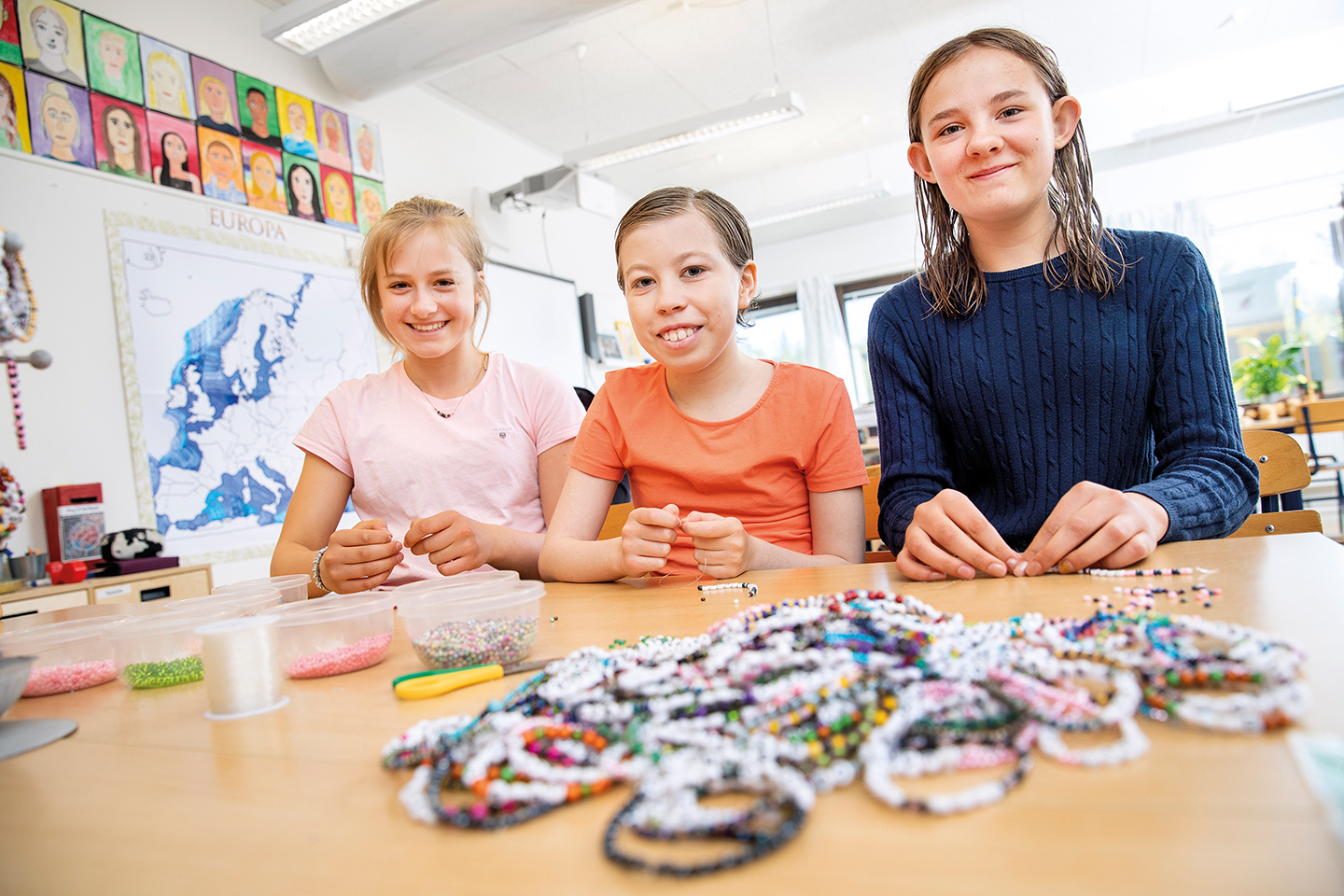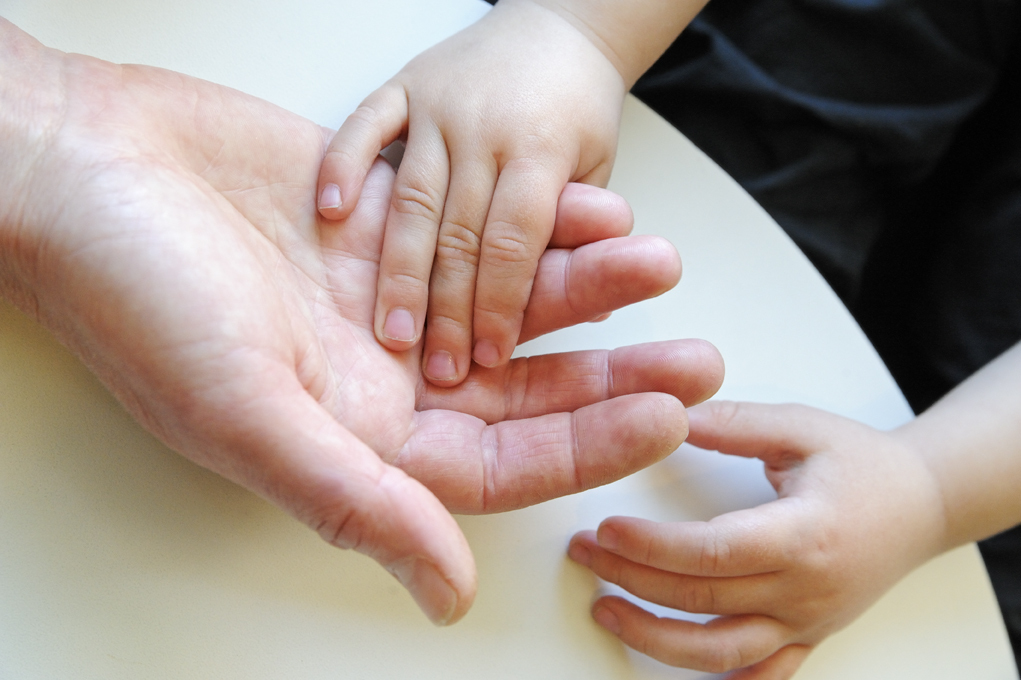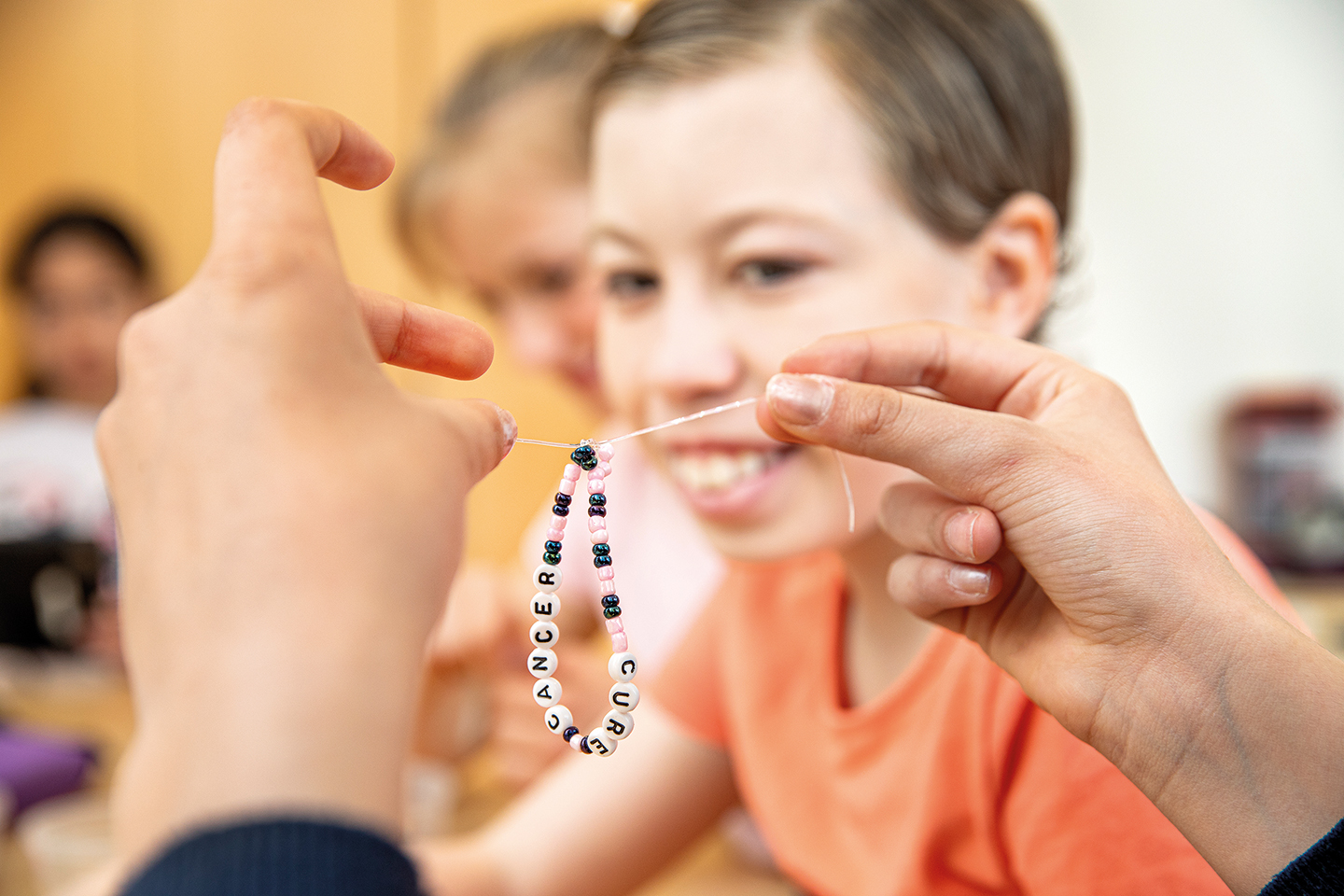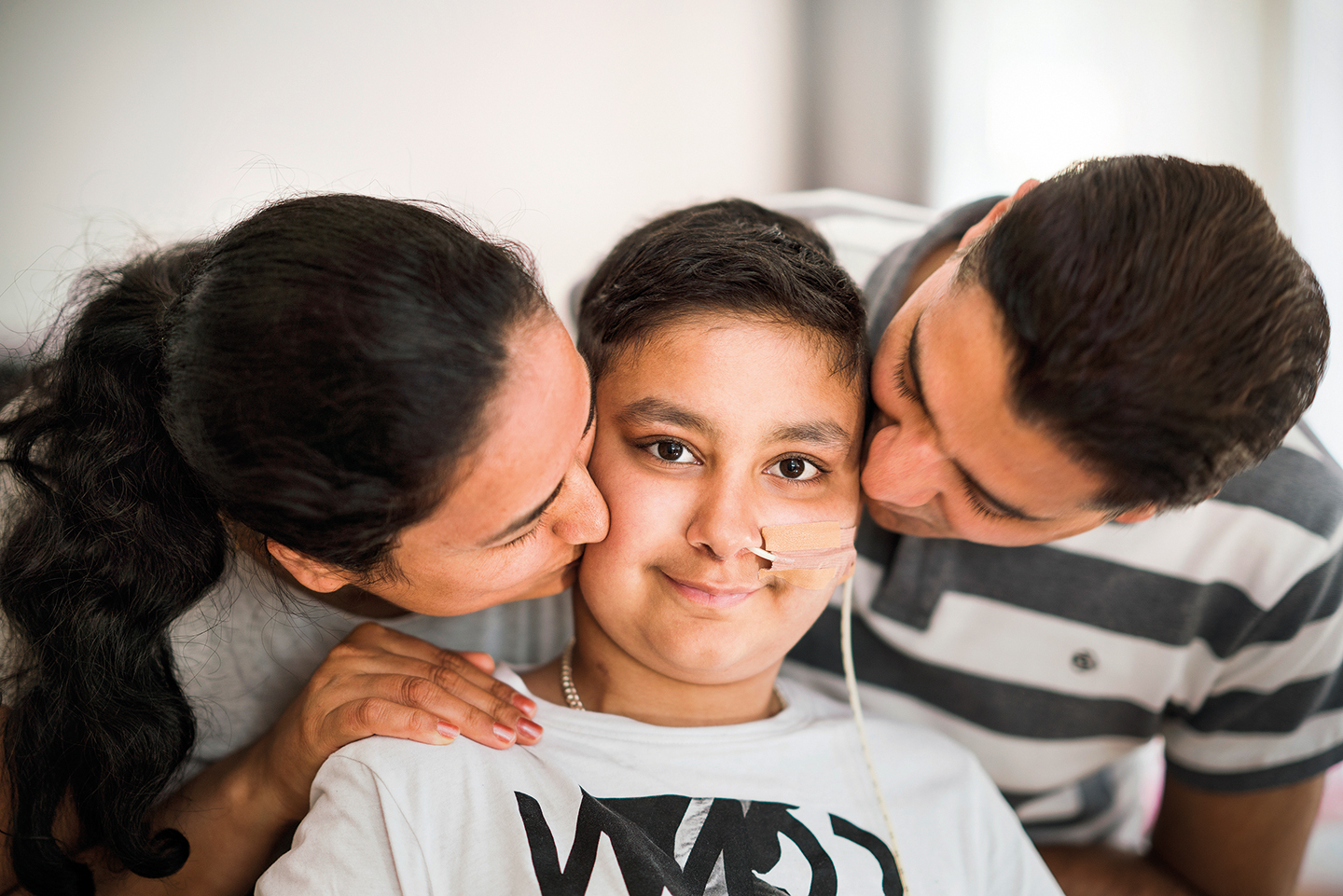This report comprises the Swedish Childhood Cancer Fund’s (802010–6566) report on sustainability according to the Annual Accounts Act 6:10-12 for the accounting period of 1 January 2019–31 December 2019.

The Swedish Childhood Cancer Fund’s core operations aim to ensure sustainability for individuals and society.
Every day, a family in Sweden gets the news: your child has cancer. It is extremely difficult to imagine what happens in the minds of the child, the family, extended family and friends at that instant. Without exaggeration, we can probably say that time stops and the tragedy explodes in their faces. From a sustainability perspective, the Swedish Childhood Cancer Fund’s task is to safeguard every chance for the child and the family to live a good life under the best possible conditions. We know that the journey from diagnosis, to treatment, to completion of medical treatment, rehabilitation and everyday life is long and in many cases complex.

ABOUT THE SWEDISH CHILDHOOD CANCER FUND
Operating model
The Swedish Childhood Cancer Fund is a non-profit organisation with six regional associations operating close to the nation’s six paediatric oncology centres. We work together to ensure that affected children, young people and their families receive the care and the support they need, as well as to raise awareness in the community about childhood cancer and its consequences. The local ties that the Swedish Childhood Cancer Fund has through its regional associations are extremely important to the overall operations and for the public’s strong confidence in the organisation. The associations are separate legal entities and conduct extremely important work in their respective regions. With the help of a large number of volunteers, the associations provide support and conduct fundraising in each region in collaboration with staff employed by the Swedish Childhood Cancer Fund.
The Swedish Childhood Cancer Fund is currently the single largest financier of research into childhood cancer in Sweden. In collaboration with the Board of Directors and the five research committees, the organisation annually makes decisions about how research funds are to be allocated in order to have the greatest possible benefit for advances in the paediatric oncology field.
Further, our focus is to create the conditions for strong, supportive structures through practical action in everyday life and through lobbying in the political sphere. The families, the medical and social care systems and other societal functions should have the support they need to ensure that the child has the same life prospects as other children.
To continue being the strong player that the Swedish Childhood Cancer Fund is today in the field of paediatric oncology, we depend on donations from individuals, businesses and foundations. The Swedish Childhood Cancer Fund’s fundraising and communication activities are crucial for this.
Our credibility in terms of getting the most possible benefit from the funds we receive is essential. One indicator that our communication initiatives hit the mark and are credible is the result of Sifo Kantar’s Charity and Fundraising Organisations ComIndex from 13 January 2020. The survey shows that the Swedish Childhood Cancer Fund is the organisation the Swedish public has most confidence in. In the results, 83 per cent state that the Swedish Childhood Cancer Fund is a reliable organization and 72 per cent state that we have a good reputation; the corresponding figures for the nearest competitor are 80 per cent and 66 per cent respectively.
In 2019 the Swedish Childhood Cancer Fund had about 70 employees (including those on parental leave, sick leave and other types of leave). To ensure further skills in specific areas, such as communication and IT, we collaborate with suppliers, partners and, where necessary, consultants, all of whom share the Swedish Childhood Cancer Fund’s values.
SUSTAINABILITY MANAGEMENT
In 2020 the organisation will initiate a project to identify its most significant sustainability issues based on the Global Goals and also to develop a sustainability policy. The basis of our sustainability efforts are our core values and our natural dedication, as well as the UN Convention on the Rights of the Child and policies regarding procurement, investments, conflicts of interest or misconduct in research, and working environment.
In 2019 nearly 200 children with cancer and their siblings participated in various camp activities that the Swedish Childhood Cancer Fund organised or arranged participation in. Around 100 families visited the Swedish Childhood Cancer Fund’s recreation facility Almers Hus. Read more about the Swedish Childhood Cancer Fund’s efforts for families of children with cancer here.

FINANCIAL RESPONSIBILITY
Purchasing & procurement
The purpose of the Swedish Childhood Cancer Fund’s procurement policy is to ensure that:
- all procurements are conducted in a professional, efficient way so that goods and services are obtained at the right price, quality and at the right time
- all procurements are documented to ensure the maximum transparency
- all procurements are conducted in accordance with the Swedish Childhood Cancer Fund’s values and ethical considerations, and that the Swedish Childhood Cancer Fund is visible in the right context.
The main principle is that contracts should not last for more than three years. Existing supplier relationships must be evaluated every three years, after which a decision will be made as to whether or not to renew the procurement. The Swedish Childhood Cancer Fund’s chief accountant is ultimately responsible for initiating this evaluation.
In all procurements, three different suppliers should be invited to tender if at all possible. For larger procurements, at least four suppliers should be invited. In cases where this is not possible, the deviation must be documented and included in the evaluation documentation.
All tenders must be evaluated against the specifications and an assessment document must be produced that clearly indicates how the assessment was conducted and how the suppliers were ranked. When assessing tenders, special emphasis should be placed on ensuring that the tenderer follows the Swedish Childhood Cancer Fund’s values and ethical considerations and that the Swedish Childhood Cancer Fund is visible in the right context.
Investments
To ensure financial security and stability, the Swedish Childhood Cancer Fund has built up equity. This is to ensure our long-term ability to award grants, so that it is not impacted by the fundraising results of a given year. This makes it possible to support research projects in the long term and at the same time make possible new initiatives in the childhood cancer field. The investment strategy must be transparent and follow the Swedish Childhood Cancer Fund’s ethical guidelines and core values.
The Swedish Childhood Cancer Fund’s Finance Committee is the advisory and administrative body of the Board of Directors. The Board of Directors determines the investment regulations annually on the suggestion of the Finance Committee. The Finance Committee makes decisions on buying or selling securities in accordance with the applicable investment regulations. Decisions will be implemented by the Swedish Childhood Cancer Fund’s chief financial officer. The Board receives monthly reports on the portfolio’s development.
Based on the purpose of this administration, the capital shall be administered with a priority on low risk and preservation of capital.
Investments may not be made in companies in which more than five per cent of the sales consist of weapons, pornography, alcohol or tobacco. If a fund holds assets that are in conflict with the ethical guidelines, they must be sold as soon as possible, or the fund must be replaced.
The Swedish Childhood Cancer Fund’s asset management is assessed annually when the chair of the Finance Committee reports the results of the management during the first quarter of the following year.
The core criterion for selected funds and managers is that they have a minimum level of sustainable work integrated in the management process. This will be secured by ensuring that the fund managers have signed the Principles for Responsible Investment (PRI). As far as possible, selected funds must also have filled in a sustainability profile according to the SWESIF standard or similar.
Read more in the guidelines for the Swedish Childhood Cancer Fund’s asset management
Anti-corruption
The Swedish Childhood Cancer Fund’s research initiatives must be well supported, transparent and have the confidence of the public, the scientific community and cancer patients. Processes that cannot be abused and purpose-designed control systems are therefore of utmost importance.
The Board of Directors of the Swedish Childhood Cancer Fund sets the framework for the allocation of research grants based on the articles of association and the research strategy. The research committees assess applications based on their relevance to childhood cancer, the scientific question, methods, competence, feasibility and demonstrated progress in the project. Decisions on the individual research grants are made by the Board of Directors based on proposals from the research committees.
The research committees consist of members with relevant expertise as well as laypeople with personal experience of childhood cancer. The members are nominated by an independent Nomination Committee and laypeople are nominated by the Swedish Childhood Cancer Fund’s members, the regional associations. The work of the Nomination Committee is regulated by a governing document. The members and the lay members are elected into the research committees by the Swedish Childhood Cancer Fund’s Board of Directors. Mandate periods ensure a turnover of members in both research committees and the Nomination Committee over time.
An important part of the decision process is managing conflicts of interest and research misconduct, which is why clear policies and procedures for this are in place.
Research misconduct
It is extremely important to combat research misconduct and ensure that the Swedish Childhood Cancer Fund’s funding does not go to projects that may be inappropriate. The Swedish Childhood Cancer Fund’s core position is to wait on action until misconduct has been found by the National Board for Assessment of Research Misconduct, NPOF, the Ethics Review Appeals Board and/or, where applicable, the researcher’s employer.
Cases regarding research misconduct are always documented in writing.
If a researcher is found guilty of research misconduct, the Swedish Childhood Cancer Fund can take one or more of the following steps:
- applications under assessment are rejected
- approved projects are rescinded
- funds that have been paid out are reclaimed
- the individual is banned from applying for new grants from the Swedish Childhood Cancer Fund for three (3) years, or indefinitely in particularly egregious cases
- approved projects can be transferred to another grant manager and/or another administrative body
Decisions regarding research misconduct are made by the Swedish Childhood Cancer Fund’s misconduct review committee.
No cases of misconduct have been found in 2019.

ENVIRONMENTAL RESPONSIBILITY
Evolution of environmental work in the administrative organisation
In 2019, as part of our responsible travel policy, we carefully planned get-togethers for regional employees to minimise environmental impact due to travel. To transition to more sustainable food consumption we have chosen vegetarian food for conferences to a greater degree. During the course of the year, we expanded our waste sorting and are increasingly transitioning to digital working methods to reduce our use of paper. One result of this is that we have reduced our need for physical document storage by two-thirds.
Sale of products
The Swedish Childhood Cancer Fund’s crocheted products – cuddly toys and coin purses – are purchased via a Danish company. The products are manufactured by women in developing countries, allowing them to stay at home and care for their children while earning a living.In the development of our latest product, the Fabric Bag, we focused particularly on materials and how the product is made. It is made of organic cotton and is Fair Trade labelled.

SOCIAL RESPONSIBILITY
Human rights
The Swedish Childhood Cancer Fund’s core operations – providing support for children with cancer and their families as well as to research, development and training – aims to ensure sustainability for individuals and society. Our values are based on the UN Convention on the Rights of the Child and strive to develop and have an effect on the medical and social care and welfare of the child based on the child’s needs, perspectives and rights. Each child with cancer and their family members are to be given the conditions they need, both during and after treatment, to live a good life now and in the future. The Swedish Childhood Cancer Fund actively works to ensure that each child with cancer, every survivor, their siblings and family members have their psychosocial, medical and financial needs met. We do this in part through a close collaboration with Sweden’s six paediatric oncology centres, where the Swedish Childhood Cancer Fund spotlights these needs and helps to propose solutions for them.